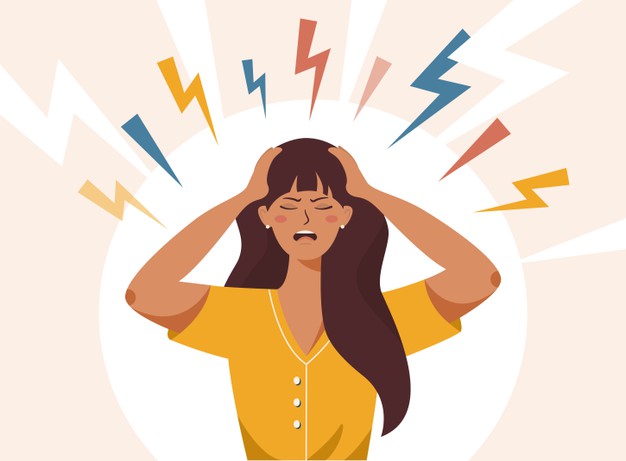
According to the ADAA, approximately 40 million Americans suffer from anxiety disorders (making it the most common mental health disorder in the country.)
You’d think that with almost 20% of the population suffering from anxiety, we’d be effective at managing and mitigating anxious feelings.
However, that’s not the case.
In fact, it appears that anxiety is only getting worse in the United States, especially after a high-stress year filled with layoffs, illness, and the deaths of loved ones.
So, how do we go about tackling the huge problem of anxiety? Well, the first step comes by rewording the question.
Try to break things into manageable chunks

Many people who suffer from anxiety suffer from feelings of overwhelm. They think things like:
“How am I going to get this project done in time?”
“I’m not as present for my kids as I should be – how do I rework my schedule?”
“I’m not happy – how do I figure out how to be?”
I’m not sure about you, but simply reading those questions started giving me anxiety. When we look at things as all-or-nothing situations, it makes the overall goal seem nearly impossible.
This could lead us to spend time on less important things rather than try to tackle the Goliath of a task that we actually need to get done.
Instead of thinking about the overall scope of a goal, try breaking it down into digestible pieces. If you’re struggling with getting a big project done at work, focus on only the very next thing you need to do.
This doesn’t mean to never look at the big picture. You still need to create a plan for getting this project done; but there’s a big difference between “I need to build a new website” and “I need to pay for a hosting platform for my website.” One is easily doable while the other is overwhelming to think of. In this case, after you buy the hosting, you check that off your list, and go to your next to-do item of interviewing website designers.
Talk to a mental health professional

I know, I know, this one may seem obvious, but many people still overlook it. In fact, only about 37% of people struggling with an anxiety disorder actually seek help.
Why is that? Almost all of us understand that speaking to a therapist will help, but only 1 in 3 actually follow through. Why?
Much of it comes down to the stigma associated with therapy. In the United States, going to therapy is often seen as being “weak;” or the only people that seek therapy are “crazy.”
These are incredibly destructive words to just casually throw around, especially for kids to grow up hearing. Imagine watching a family member be taunted or gossiped throughout your childhood; how likely are you going to be to seek help as an adult when you need it?
However, say you move past any judgments you’re feeling, and you decide to make an appointment with a mental health professional. You can choose to start with a therapist, who will help you begin to untangle the deeper issues driving your anxiety.
If they discover you have fairly severe anxiety, they may recommend you go to a psychiatrist, who can prescribe your medication to mitigate your anxiety. The most common medications are antidepressants, anxiety drugs called benzodiazepines, antidepressants, mood stabilizers and serotonin reuptake inhibitors. You should discuss the side effects and risks with your healthcare professional or if you are taking over-the-counter medications or supplements do research. Reputable companies like Chemical Planet and BrainPill are transparent about their formulas.
However, if you have an addictive personality, you may want to be wary about using medication as a long-term solution. As The Exclusive Hawaii explains, addiction to Xanax and other anti-anxiety medications can develop rather quickly.
Develop a meditation ritual

Meditation has been used for thousands of years, and it’s no question why.
The act of meditating gives you a broader awareness of yourself, but also how you fit into the world. You learn to recognize that while change is inevitable, your strength and character are able to grow with you. You remain a constant, no matter what happens around you.
Additionally, your body will begin to reflect the benefits of sitting silently and practicing your breathing. Oftentimes, when you meditate, you enter into a feeling of relaxation, and your heartbeat and breathing slow down.
For someone who regularly suffers from anxiety (and the racing heartbeat and fast breathing that accompanies it), this reprieve can be a welcome relief.
Make time for something you love

Think about how you feel when you’re about to give a big presentation.
Now think how you feel when you’re doing something you love to do, whether that be playing basketball, painting, fixing up an old car, or practicing piano.
Can you feel the difference between the two? The first may have triggered that all-too-familiar anxious feeling in your stomach, while the second hopefully calmed that feeling away.
Humans are passionate beings—there’s no way around it. We love to partake in leisure activities that connect to who we are at a core level. When we get to express our creativity, brilliance, or physical abilities, we can feel that happy glow on our cheeks and in our souls.
Unfortunately, as we grow older, many of us leave our passions behind for more “practical” usages of our time. Sometimes these are necessary and life-giving in their own way, like raising our kids or furthering our education. Other times, however, they are simply convenient options: watching TV, playing video games, scrolling through social media.
Sometimes these “easy” activities can bring on even more anxiety in our lives. If you watch particularly gruesome or distrubed TV shows, you may find yourself playing back awful scenarios in your head. You may even have a hard time sleeping, which only furthers your anxiety.
Or, if you spend a lot of time on social media, you might find yourself comparing yourself to your peers, or experiencing FOMO (fear of missing out). You may decide that you’re not as good or as pretty or as fun as your online friends, and this belief can tank your self-worth. And when we’re not confident about who we are, what happens? Our anxiety often goes up.
Instead, carve out time to do things that bring you pure joy. Sign up for the pottery class. Join that free tennis league. Whatever you choose to pursue, make sure you’re doing it for you and only you.








